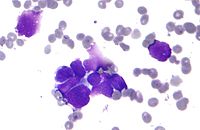
Photo from wikipedia
Background There is no effective systemic therapy for metastatic adrenal cortical carcinoma (ACC) after failure of platinum-based chemotherapy. The efficacies of single-agent oral multikinase inhibitors (MKIs) or salvage immune checkpoint… Click to show full abstract
Background There is no effective systemic therapy for metastatic adrenal cortical carcinoma (ACC) after failure of platinum-based chemotherapy. The efficacies of single-agent oral multikinase inhibitors (MKIs) or salvage immune checkpoint inhibitors (CPIs) have been very limited. It is unknown whether combining CPIs, such as pembrolizumab (PEM), with other therapies, such as MKIs, could yield higher response rates in ACC, yet this combination has shown promise in other cancers. Herein, we describe the first case series using PEM in combination with the MKI lenvatinib (LEN) in patients with progressive, metastatic ACC. Methods A retrospective case series describing the use of LEN/PEM as salvage therapy in patients with progressive/metastatic ACC. Results Eight patients were treated with the LEN/PEM combination therapy. Half were female, and the median age at time of diagnosis was 38 years (range 21–49). Three (37.5%) patients had hormonally active ACC. The median number of prior lines of systemic therapy was 4 (range 2–9). Six (75%) patients had had disease progression on prior CPIs and five (62.5%) patients had progressed on prior MKI therapy. The median progression-free survival was 5.5 months (95% CI 1.8–not reached) and median duration of therapy was 8.5 months (range 2–22). Two (25%) patients had a partial response, one (12.5%) patient had stable disease, and five (62.5%) patients had progressive disease. None of the eight patients stopped therapy because of adverse events. Conclusions In our small cohort of heavily pretreated patients with ACC, the combination of LEN/PEM was associated with objective responses in a subset of patients without significant toxicity. This combination should be formally investigated in phase II clinical trial with robust correlative studies to identify predictors for response.
Journal Title: Journal for Immunotherapy of Cancer
Year Published: 2020
Link to full text (if available)
Share on Social Media: Sign Up to like & get
recommendations!